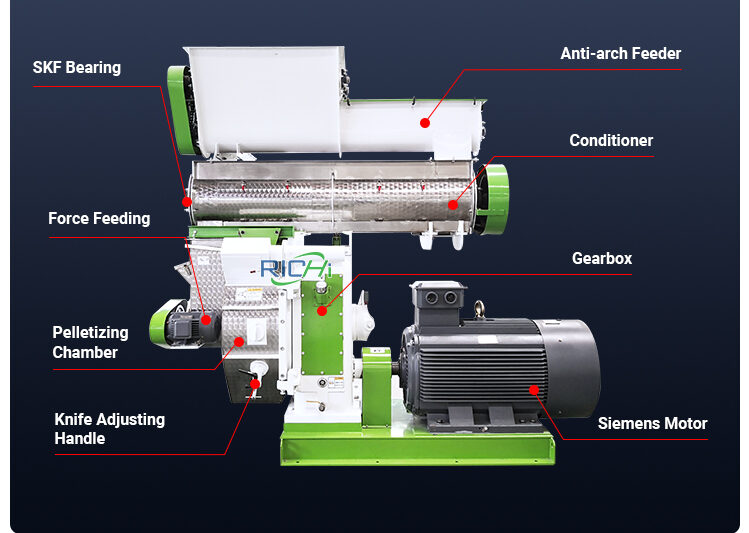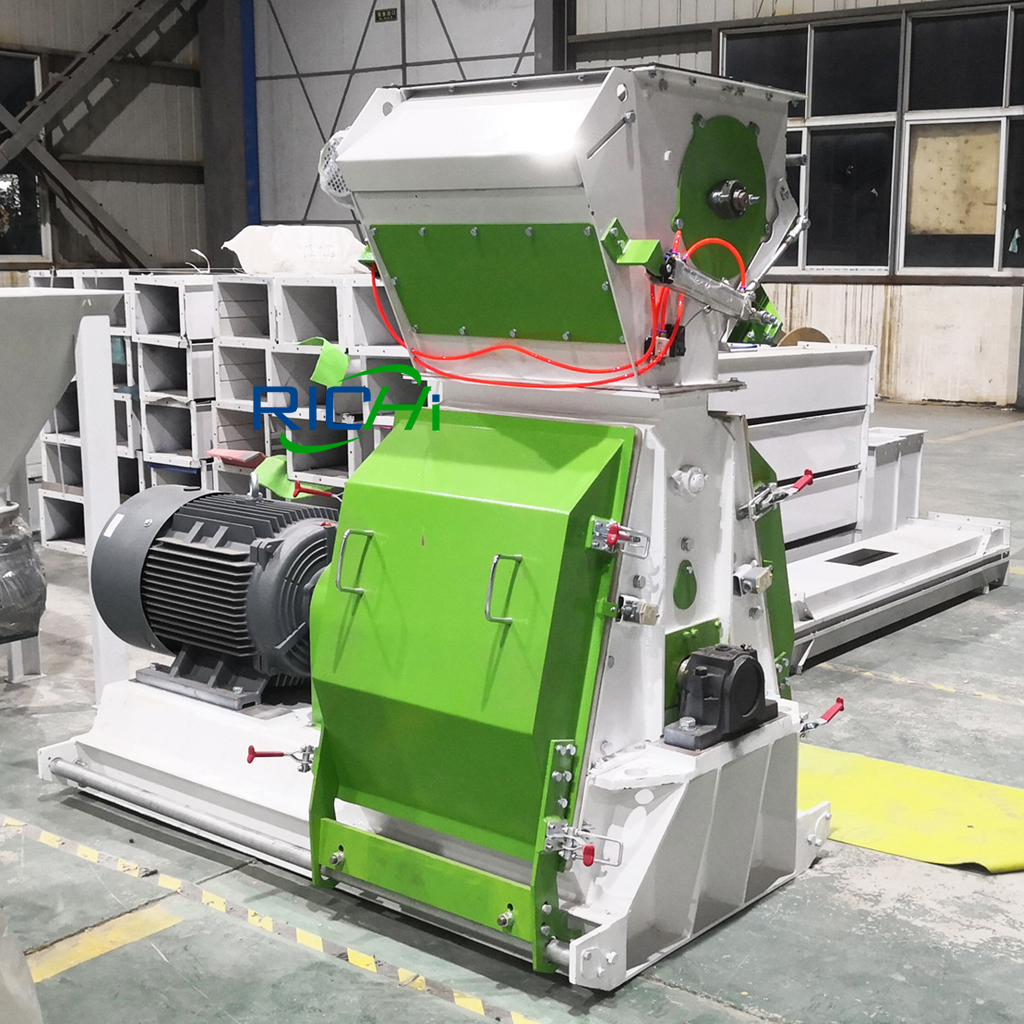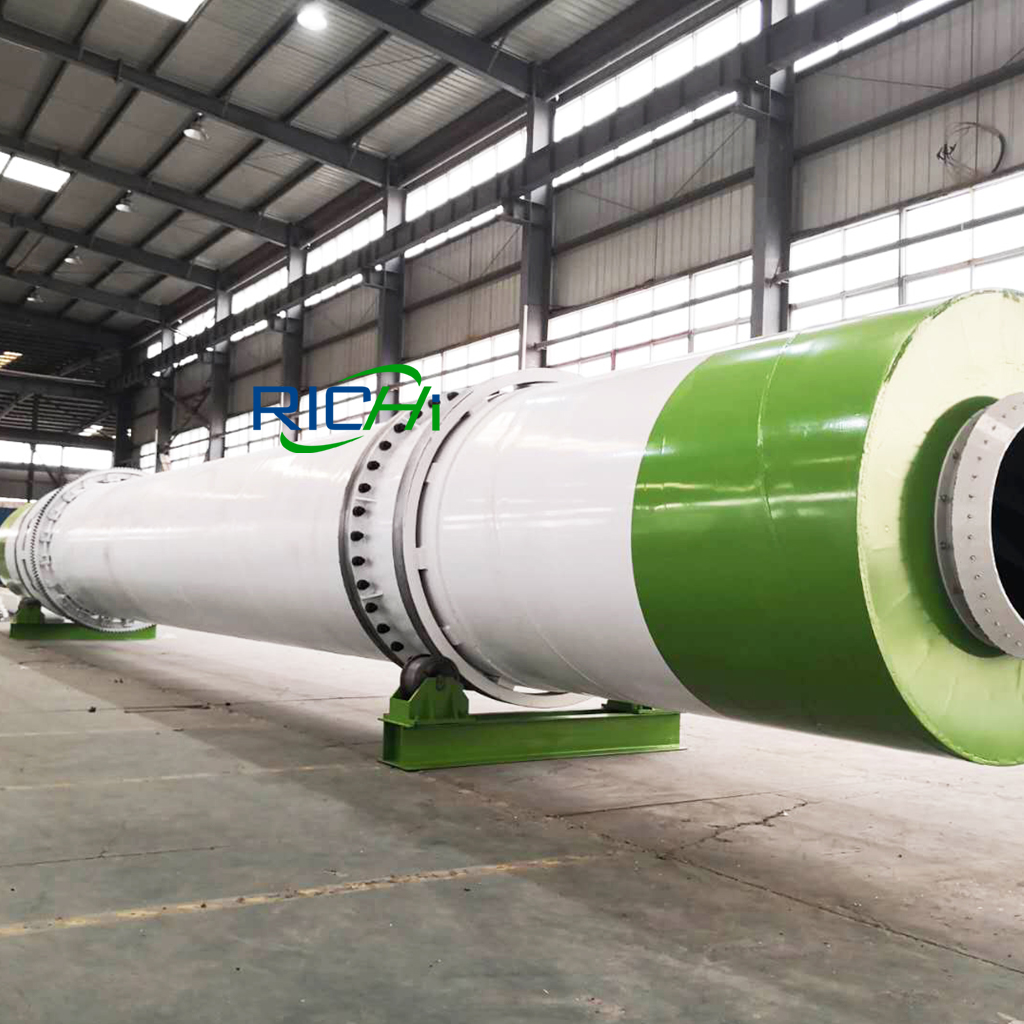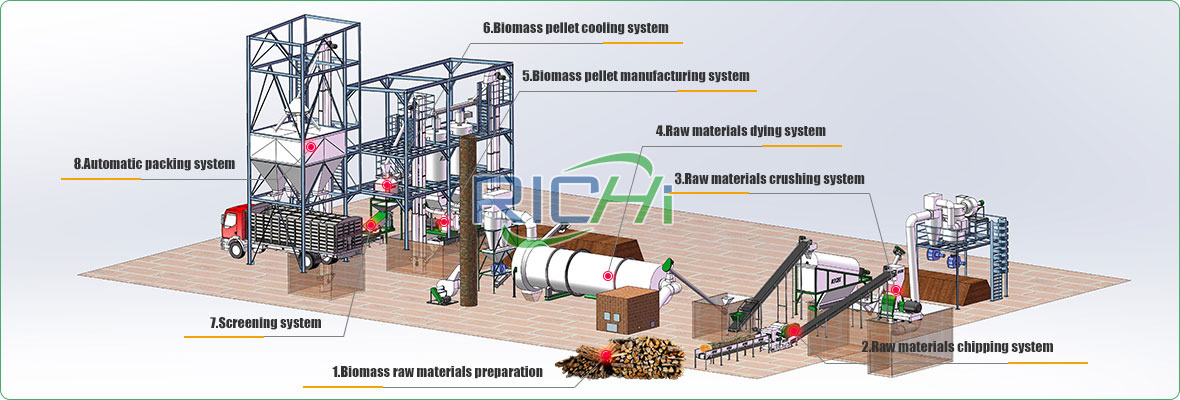Leading Pelletizing Machine Manufacturer
Welcome to Henan RICHI Machinery Co., Ltd, Premier Pelletizing Machine Manufacturer.
After 30 years of development, RICHI Machinery has become a conglomerate of Pellet Production Solution Providers integrating Pellet Production Equipment Design, Manufacturing, Overseas Installation and Training.
Just tell us your raw materials and production requirements to get a customized pellet production solution from RICHI. Also welcome to visit the factory at any time.
About Our Pelletizing Machines
01
High efficiency and performance
Our pelletizing machines are engineered to deliver exceptional efficiency and performance, ensuring that you get the maximum output with minimal energy consumption.
02
Durable and robust construction
Built to withstand the rigors of continuous operation, our pelletizing machines boast durable and robust construction that ensures long-term reliability and minimal maintenance.
03
Customizable for various raw materials
Flexibility is a key feature of our pelletizing machines, which are designed to handle a wide range of raw materials, making them suitable for various applications.
04
User-friendly design
Ease of use and safety are paramount in the design of our pelletizing machines, ensuring that your operators can efficiently and safely manage the production process.
Explore Our Pellet Mill Machines
MZLH320 series ring die wood pellet machine ensures high capacity and efficient control of the pelleting process. The wood pellet mill machine is dimensioned for large and designed with exchangeable wear parts.
- Power: 37KW
- Capacity: 600-800KG/H
- Pellet Size: 6-12mm
MZLH350 series ring die wood pellet making machine has wide adaptability. According to different raw materials, different pellets can be produced. Larger feeders increase production capacity and ensure production efficiency.
- Power: 55KW
- Capacity: 800-1000KG/H
- Pellet Size: 6-12mm
This ring die electric wood pellet mill is recommended for straw pellet production plant. Due to the power and voltage, it is not recommended for household pelletizing. It is very suitable for making straw pellets, alfalfa pellets, forage pellets, wood sawdust pellets, and other biomass pellets.
- Power: 110KW
- Capacity: Capacity: 1.5-2T/H
- Pellet Size: 6-12mm
The MZLH520 series wood pellet maker has a larger ring die and pelletizing chamber to ensure high-efficiency straw pellet production. In order to adapt to lighter raw materials, we have added a forced feeder.
- Power: 160KW
- Capacity: 3-4T/H
- Pellet Size: 6-12mm
MZLH768 series large commercial wood pellet press is mainly used for the production of biomass pellets. Enlarged feeders and larger ring die sizes are more suitable for straw pellet plants.
- Power: 250KW
- Capacity: 5-7T/H
- Pellet Size: 6-12mm
RICHI wood pelletizer for sale. 27 years of pelleting plant experience, professional design and manufacturing team, overseas installation engineers, competitive factory direct sales prices. Advanced pelleting process technology.
- Power: 280KW
- Capacity: 8-10T/H
- Pellet Size: 6-12mm
Why Choose RICHI Machinery as Your Pelletizing Machine Manufacturer?
Selecting the right pelletizing machine manufacturer is crucial for the success of your production operations. Here’s why RICHI Machinery stands out as the premier choice for your pellet mill machine needs:
- Extensive Industry Experience
- Proven Track Record
- Cutting-Edge Technology
- Innovative Solutions
- Precision Engineering
- Superior Customer Support
- Comprehensive Services
- Customized Solutions
- Competitive Pricing
- Value for Money
- Transparent Pricing
- High-Quality Standards
- Robust Construction
- Consistent Output



Brands We Partner With




Pellet Production Line

Complete pellet production line, customizable
The key determining factors in the design of the pellet production line, the production process and the configuration of the pellet mill machines are the raw material and the production capacity. RICHI Machinery customizes the complete pellet plant according to the status of the raw material, the production capacity required and the size of the workshop on the site.
RICHI Machinery
Pellet production line guide
Setting up a pellet production line involves several key steps, from initial planning and site preparation to equipment installation and production start-up.
Initial Planning
Market Research
Supply Chain: Research the availability of raw materials (e.g., wood chips, sawdust, straw, agricultural residues) and potential suppliers.
Feasibility Study
Profitability Analysis: Estimate potential revenue, operational costs, and profit margins to ensure the project’s financial viability.
Site Selection and Preparation
Location
Utilities: Ensure the site has reliable access to electricity, water, and other necessary utilities.
Facility Layout
Safety and Compliance: Ensure the facility meets local safety regulations and environmental standards.
Equipment Selection and Procurement
Key Equipment
Dryer : For reducing the moisture content of raw materials.
Pellet Mill : For compressing the dried materials into pellets.
Cooler : For cooling down the hot pellets after production.
Sifter : For separating finished pellets from fines and ensuring uniform size.
Bagging Machine : For packaging the pellets into bags for storage and transport.
Vendor Selection
Technical Support: Ensure the vendor provides adequate technical support, including installation, training, and maintenance services.
Operational Training
Staff Training
Safety Protocols: Educate employees on safety procedures and emergency protocols.
Process Optimization
Process Monitoring: Use monitoring systems to track production parameters and optimize processes.
Production Start-Up
Initial Production Run
Trial Production: Conduct a trial production run to fine-tune the equipment settings and identify any issues.
Full-Scale Production
Adjustments: Make any necessary adjustments to optimize performance and output.
Quality Control and Assurance
Product Testing
Compliance: Ensure the pellets meet industry standards and customer specifications.
Continuous Improvement
Process Enhancements: Continuously enhance processes and equipment based on feedback and performance data.
Marketing and Sales
Branding and Promotion
Digital Marketing: Utilize digital marketing strategies, including social media, and online advertising, to reach potential customers.
Sales Channels
Customer Relationships: Build and maintain strong relationships with customers to encourage repeat business and referrals.
Learn more about biomass pelletizing solutions
When investing in a pellet production line, understanding the factors that affect costs and how to get a tailored quote is essential to making an informed decision. Contact RICHI Machinery today to get the latest pellet production line price and the factors that affect pellet production solutions.
Frequently Asked Questions
Common questions about pelletizing machines and pellet production lines, with detailed answers.
-
What is a pelletizing machine?
A pelletizing machine is a type of equipment used to compress raw materials into small, dense pellets. These pellets can be used for various purposes, including biomass fuel, animal feed, and more.
-
How does a pellet production line work?
A pellet production line involves several key steps:
Crushing: Raw materials are crushed into smaller particles using a hammer mill.
Drying: The crushed materials are dried to the appropriate moisture content using a dryer.
Pelletizing: The dried materials are compressed into pellets using a pellet mill.
Cooling: The hot pellets are cooled to harden them and improve durability using a cooler.
Screening: The cooled pellets are screened to remove fines and ensure uniform size.
Packaging: The final pellets are packaged into bags for storage and transport using a bagging machine. -
What types of raw materials can be used in a pellet production line?
Common raw materials include wood chips, sawdust, straw, rice husks, agricultural residues, and other biomass materials. For feed pellets, materials such as grains, corn, soybean meal, and other agricultural by-products are used.
-
What factors should I consider when choosing a pellet mill machine?
Consider the following factors:
Production Capacity: Determine the required output in tons per hour.
Raw Material Type: Ensure the machine can process your specific raw materials.
Pellet Size: Choose a machine that can produce the desired pellet size.
Power Requirements: Ensure your facility can meet the power requirements of the machine.
Budget: Consider the initial investment and long-term operational costs. -
How can I ensure the quality of the pellets produced?
To ensure high-quality pellets:
Maintain Proper Moisture Content: Ensure raw materials have the correct moisture content (typically 10-15%).
Use Consistent Raw Material Sizes: Ensure raw materials are uniformly sized.
Monitor Compression Ratio: Adjust the compression ratio of the pellet mill die as needed.
Regular Maintenance: Keep the equipment well-maintained to ensure consistent performance. -
Why Choose RICHI Machinery as Your Pelletizing Machine Manufacturer?
At Henan RICHI Machinery Co., Ltd, we stand out as a leading pelletizing machine manufacturer due to our commitment to quality, innovation, and customer satisfaction. Here’s why you should choose us:
Extensive Industry Experience: With 30 years in the pelletizing industry, we have the expertise to deliver top-notch solutions tailored to your needs.
High-Quality Equipment: Our machines are built with the finest materials and cutting-edge technology, ensuring durability and high performance.
Customizable Solutions: We offer bespoke solutions that cater to your specific raw materials and production requirements.
Excellent After-Sales Support: Our dedicated support team is always ready to assist you with installation, training, and maintenance.
Competitive Pricing: We provide high-value solutions at competitive prices, with clear and transparent pricing structures.
Compliance and Sustainability: Our equipment meets all industry standards and we are committed to sustainable practices.
By considering these factors and choosing RICHI Machinery, you can ensure that your pellet production line operates efficiently, reliably, and sustainably.
-
What is the ideal moisture content for pelletizing?
The ideal moisture content for pelletizing generally ranges between 10% and 15%. This ensures optimal pellet formation and quality.
-
How much does a pellet production line cost?
The cost varies depending on several factors, including production capacity, type of raw materials, equipment specifications, and any customization required. It's best to get a customized quote based on your specific needs.
-
How long does it take to set up a pellet production line?
The setup time depends on the complexity of the production line, including site preparation, equipment installation, and commissioning. Typically, it can take several weeks to a few months from initial planning to full operation.
-
What safety precautions should be taken when operating a pellet production line?
Regular maintenance is crucial for optimal performance. Key tasks include:
Cleaning: Regularly clean the equipment to prevent build-up and blockages.
Lubrication: Lubricate moving parts to reduce friction and wear.
Inspection: Regularly inspect and replace worn or damaged parts, such as dies, rollers, and bearings. -
Are there any safety concerns with operating a pellet production line?
Yes, safety is paramount. Key safety measures include:
Training: Ensure operators are properly trained.
PPE: Provide personal protective equipment, such as gloves, goggles, and ear protection.
Emergency Procedures: Establish and practice emergency shutdown procedures.
Fire Safety: Implement fire safety measures, as dust from raw materials can be highly flammable. -
What should I look for when choosing a pelletizing machine manufacturer?
A: Choosing the right pelletizing machine manufacturer is crucial for ensuring the success and efficiency of your pellet production operations. Here are some key factors to consider:
1. Experience and Reputation
Industry Experience: Look for manufacturers with extensive experience in the pelletizing industry. A company with a long track record is more likely to have refined their technology and processes over time.
Reputation: Research the manufacturer’s reputation within the industry. Customer reviews, case studies, and testimonials can provide insights into the reliability and performance of their machines.
2. Quality of Equipment
Materials and Construction: Ensure the manufacturer uses high-quality materials and robust construction methods. Durable equipment reduces downtime and maintenance costs.
Technology and Innovation: Choose a manufacturer that invests in research and development. Innovative features and advanced technology can improve efficiency and output.
3. Customization and Flexibility
Custom Solutions: The ability to customize equipment to meet specific needs is essential. Whether it’s adapting to different raw materials or production capacities, flexibility in design and functionality is crucial.
Scalability: Consider if the manufacturer can provide solutions that can scale with your business growth.
4. After-Sales Support and Service
Technical Support: Reliable after-sales support is vital for maintaining optimal machine performance. Ensure the manufacturer offers comprehensive technical support, including installation, training, and maintenance services.
Spare Parts Availability: Check if the manufacturer has a robust supply chain for spare parts. Quick access to replacement parts minimizes downtime.
5. Cost and Value
Competitive Pricing: While price is an important factor, it shouldn’t be the only consideration. Evaluate the overall value, including the quality of the equipment, after-sales support, and potential long-term savings.
Transparency: Choose a manufacturer that provides transparent pricing with no hidden costs. Detailed quotations should include all aspects of the purchase, installation, and maintenance.
6. Compliance and Standards
Certifications: Ensure the manufacturer’s equipment complies with industry standards and certifications. This ensures the machines are safe, reliable, and meet regulatory requirements.
Environmental Considerations: Consider manufacturers that prioritize sustainability and environmental impact. Energy-efficient machines and eco-friendly practices are increasingly important in today’s market.

